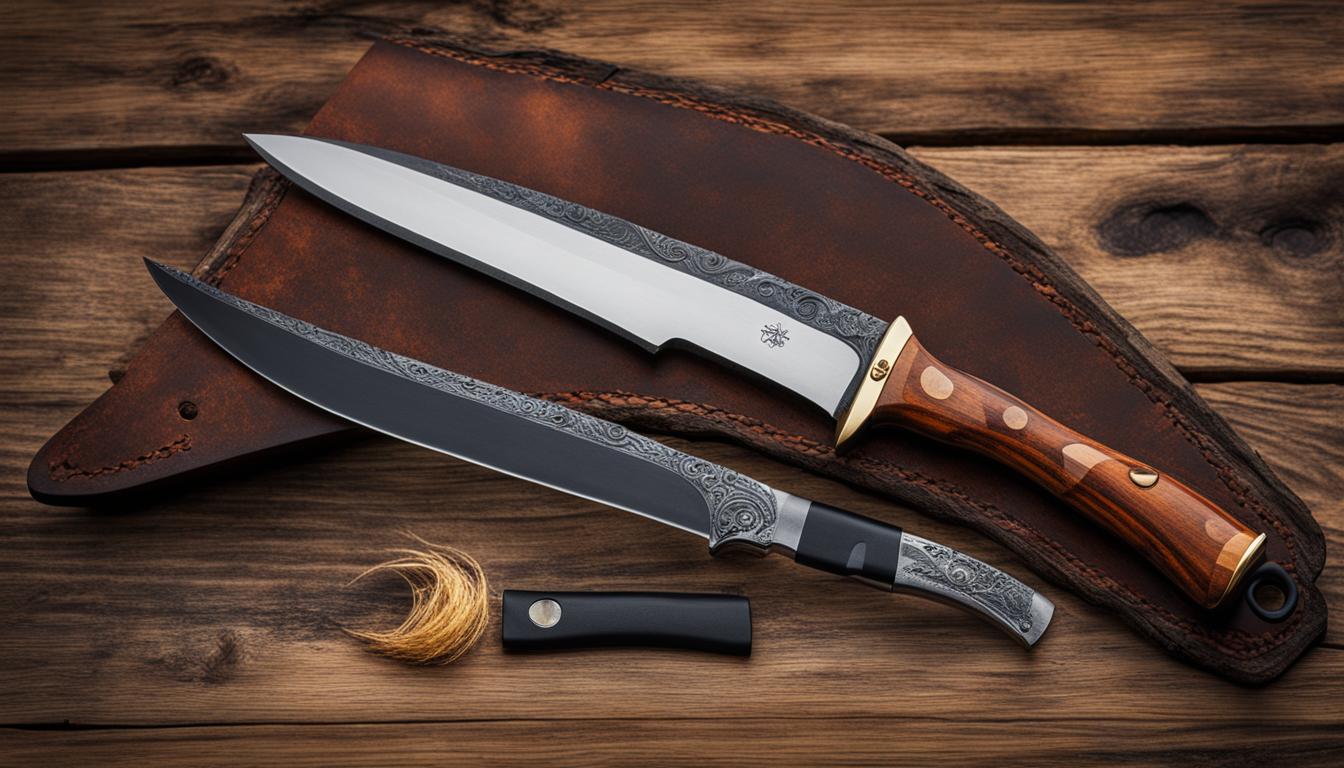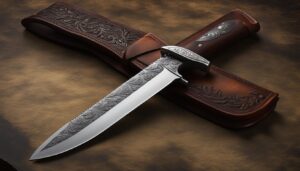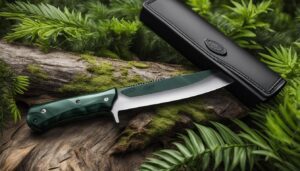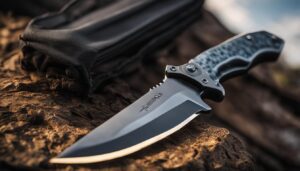A balanced hunting knife is a must-have tool for every hunter, offering unmatched precision and versatility. It is the key to a successful hunting experience, providing the necessary strength, durability, and functionality required for various tasks in the field. Whether you are an experienced hunter or a novice, a well-balanced hunting knife will become your trusted companion.
The balanced hunting knife features a lightweight tactical blade that is evenly weighted, making it effortless to handle. Its design ensures optimal performance and maneuverability, allowing you to make precise cuts and slices with ease. This versatile tool is not only ideal for hunting but also serves as a well-balanced survival knife and an equally distributed outdoor cutter.
With an extra broad American CPM3-V High Carbon Steel blade, the balanced hunting knife offers razor-sharpness that can withstand even the toughest conditions. The curved cutting edge effortlessly slices through tough hide, while the stout drop point makes field dressing and skinning a breeze. Its blade’s thickness of 3/16″ provides the necessary strength for handling even the largest animals.
The grip of the balanced hunting knife is made from shock-absorbent Kray-Ex™, ensuring a secure and comfortable hold even in extreme weather conditions. With its durable sheath for convenient carrying, this well-balanced hunting knife is the perfect companion for dedicated hunters who demand the very best.
Key Takeaways:
- A balanced hunting knife offers unmatched precision and versatility in the field.
- It features a lightweight tactical blade that is evenly weighted for optimal performance.
- The knife’s design ensures effortless handling and precise cuts and slices.
- With its extra broad American CPM3-V High Carbon Steel blade, it offers razor-sharpness and strength.
- The grip is made from shock-absorbent Kray-Ex™, providing a secure and comfortable hold.
Choosing the Right Hunting Knife: Factors to Consider
When it comes to selecting a hunting knife, there are several important factors to consider. Unlike kitchen knives, which are primarily designed for culinary tasks, hunting knives are specifically crafted for outdoor scenarios and game preparation. Here are some key considerations to keep in mind:
- Material: Hunting knives are typically made from tough and corrosion-resistant materials like stainless steel or titanium. These materials ensure durability and longevity, making them suitable for the demands of hunting in various environments.
- Design: A robust and ergonomic design is crucial for a hunting knife. The knife should be capable of withstanding rigorous fieldwork and provide a comfortable grip for precise control. Look for features such as a full tang construction, which ensures the blade extends through the handle for added strength.
- Hunting Scenario: Consider the type of game you’ll be hunting and the specific tasks involved. Different knives are designed for different purposes, such as skinning, field dressing, or caping. It’s important to choose a knife that suits your specific needs and hunting style.
- Versatility: While it’s important to choose a knife purpose-built for hunting, versatility should also be a factor. A versatile hunting knife can handle a range of tasks, from basic campsite duties to more specialized hunting preparations.
Remember, selecting the right hunting knife is a personal choice, and what works best for one hunter may not work for another. It’s important to assess your specific requirements and consider the unique features and benefits offered by different knives. By carefully evaluating these factors, you can ensure that you choose a hunting knife that is a reliable and indispensable tool for your outdoor adventures.
Table: Comparison of Key Factors for Choosing a Hunting Knife
| Factor | Importance | Stainless Steel | Titanium |
|---|---|---|---|
| Corrosion Resistance | High | High | High |
| Durability | High | High | High |
| Blade Strength | High | High | Medium |
| Versatility | Medium | High | Medium |
| Ease of Maintenance | Medium | High | High |
This comparison table offers an overview of key factors to consider when choosing between stainless steel and titanium hunting knives. While both materials are highly durable and corrosion-resistant, titanium offers slightly less blade strength compared to stainless steel. However, titanium excels in terms of versatility and ease of maintenance. Ultimately, the choice between these two materials will depend on your personal preferences and priorities.
Types of Hunting Knives and Their Uses
When it comes to hunting knives, there are various types available, each designed for specific purposes. Understanding the different types and their uses can help you choose the right knife for your hunting needs. Here are some of the most common types:
Folding Knife
A folding knife, also known as a pocket knife, is a versatile and compact option for hunters. Its folding design allows for easy portability and storage. These knives typically have a lightweight construction and are suitable for a wide range of tasks in the field. From cutting rope to preparing game, a folding knife can be a valuable tool for any hunter.
All-Purpose Knife
An all-purpose hunting knife is designed to handle a variety of tasks. These knives usually have a fixed blade and a sturdy construction that can withstand rigorous use. With their versatile design, all-purpose knives are ideal for field dressing, skinning, and other general hunting tasks. Look for a well-balanced and comfortable grip to ensure precise control during use.
Fillet Knife
A fillet knife is specifically designed for precision work, such as deboning fish and fowl. These knives have thin, flexible blades that allow for precise cuts and maximum control. Look for a fillet knife with a sharp and narrow blade to easily maneuver around bones and joints. Some fillet knives even come with a hand sharpener to maintain their sharpness.
Gut Hook Knife
A gut hook knife is equipped with a curved and sharpened hook-like blade that is specifically designed for field dressing game. The gut hook allows you to open up the animal’s abdomen without puncturing the organs, making it easier to remove the internal organs. These knives often have a durable and ergonomic handle for comfortable and safe handling.
Choosing the right hunting knife depends on the specific tasks you’ll be performing during your hunting adventures. Consider factors such as the type of game you’ll be hunting, the environment you’ll be in, and your personal preferences. By selecting a knife that suits your needs, you can ensure a successful and enjoyable hunting experience.
Caring for Your Hunting Knife: Maintenance and Sharpening Tips
Proper maintenance and sharpening are vital for keeping your hunting knife in optimal condition. Regularly sharpen your knife using a portable camping knife sharpener or a sharpening kit. After sharpening, hone the blade using an old leather belt or a ceramic rod.
Keep your knife dry and wipe it down after each use to prevent rust and corrosion. Disassemble and clean folding knives for thorough maintenance and apply machine lubricant to the folding mechanism. Store your knife in a sheath made of leather, plastic, metal, or polymer to protect it from the elements.
By following these care tips, you can ensure the longevity and performance of your hunting knife.
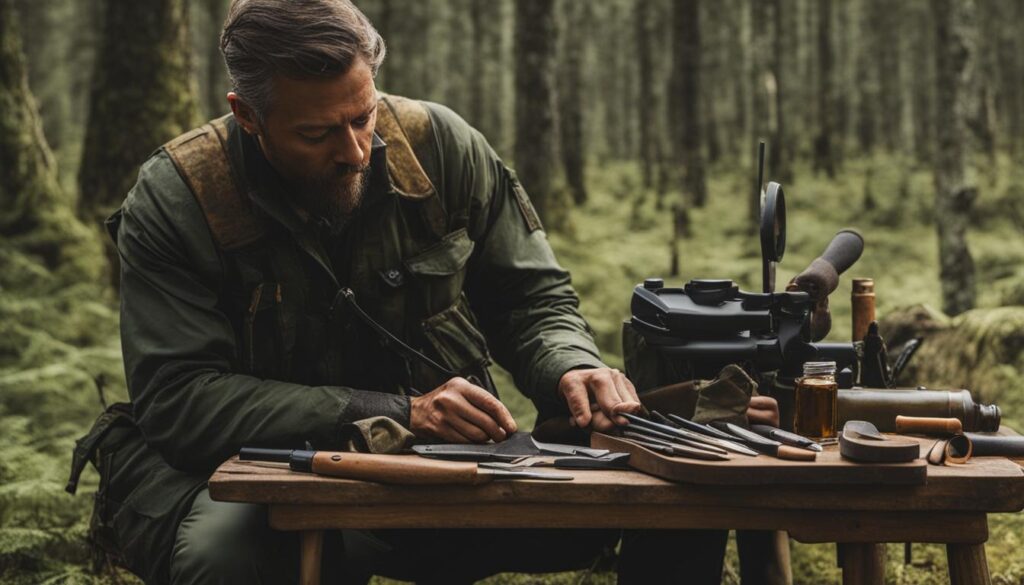
Conclusion
A balanced hunting knife is a versatile tool that every hunter should consider adding to their arsenal. With its unmatched precision and versatility, it ensures optimal performance and durability in the field. By carefully choosing the right hunting knife and taking proper care of it, you can enhance your hunting experience and make the most of your outdoor adventures.
When selecting a hunting knife, it’s important to take into account your specific needs and the type of game you’ll be hunting. Whether you prefer a folding knife for its portability or a specialized fillet knife for precise tasks, choosing the right knife for the job is crucial. A well-balanced hunting knife will provide the necessary strength and cutting power to handle even the toughest tasks.
Caring for your hunting knife is equally important for its longevity and performance. Regular maintenance, sharpening, and proper storage are key to keeping your knife in optimal condition. Remember to clean and dry your knife after each use, apply lubricant to folding mechanisms, and store it in a suitable sheath to protect it from the elements.
In conclusion, a balanced hunting knife is a valuable tool and investment for any hunter. Its versatility, precision, and durability make it an indispensable companion in the field. By choosing the right knife and caring for it properly, you can ensure a successful hunting experience for years to come.
FAQ
What makes a hunting knife balanced?
A balanced hunting knife is designed with an evenly distributed weight throughout the blade and handle, providing optimal control and precision.
Why is a balanced hunting knife important?
A balanced hunting knife offers unmatched precision and versatility, making it easier to perform tasks such as field dressing, skinning, and slicing through tough hide.
What materials are hunting knives made from?
Hunting knives are typically made from tougher, more corrosion-resistant materials like stainless steel or titanium.
What type of hunting knife should I choose?
It’s important to select a hunting knife that suits your specific needs and the type of game you’ll be hunting. Consider factors such as folding knives for portability, fillet knives for precise work, or gut hook knives for skinning game.
How should I maintain and sharpen my hunting knife?
Regularly sharpen your knife using a portable camping knife sharpener or a sharpening kit. After sharpening, hone the blade using an old leather belt or ceramic rod. Keep your knife dry, wipe it down after each use, and store it in a sheath to protect it from rust and corrosion.
